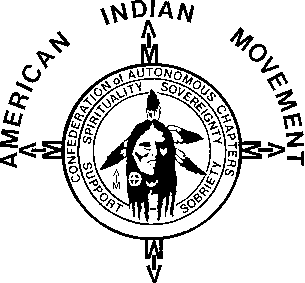 Indigenous People Must
Indigenous People Must
 Indigenous People Must
Indigenous People Must
Organize!!!
Kwame Ture (formerly known as Stokley Carmichael). Except from a speech delivered at the Yellow Thunder demonstrations in Rapid City, South Dakota, on October 1, 1982, sponsored by the
American Indian Movement, he said:
"We are engaged in a struggle
for the liberation of ourselves as people. In this, there can be neither success
nor even meaning unless the struggle is directed toward the liberation of our
land, for a people without land cannot be liberated. We must reclaim the land,
and our struggle is for the land-first, foremost, and always. We are people of
the land."
"So in Africa, when you speak
of "freeing the land," you are at the same time speaking about the
liberation of the African people. Conversely, when you speak of liberating the
people, you are necessarily calling for the freeing of the land."
"But, in America, when we
speak of liberation, what can it mean? We must ask ourselves, in America, who
are the people of the land? And the answer is-and can only be-the first
Americans, the Native Americans, the American Indian. In the United States of
America, when you speak of liberation, or when you speak of freeing the land,
you are automatically speaking of the American Indians, whether you realize it
or not. Of this, there can be no doubt."
"Those in power in the United
States understand these principles very well. They know that even under their
own laws aboriginal title precedes and preempts other claims, unless transfer of
title to the land was is or agreed to by the original inhabitants. They know
that the only such agreements to which they can make even a pretense are those
deriving from some 371 treaties entered into by the U.S. with various Indian
nations indigenous to North America."
"Those in power in America
know very well that, in consolidating its own national landbase, the United
States has not only violated every single one of those treaties, but that it
remains in a state of perpetual violation to this day. Thus, they know they have
no legal title-whether legality be taken to imply U.S. law, international law,
Indian law, natural law, or all of
these combined-to much of what they now wish to view as the
territoriality of the United States proper."
"Finally, they are aware that to acquire even a semblance of legal title, title which stands a chance of passing the informed scrutiny of both the international community and much of its own citizenry, the U.S. must honor its internal treaty commitments, at the very least. Herein lies the dilemma: In order to do this, the U.S. would have to return much of its present geography to the various indigenous nations holding treaty-defined and reserved title to it (and sovereignty over it). The only alternative is to continue the violation of the most fundamental rights of Native Americans, while pretending the issues do not exist. Of course, this is the option selected-both historically and currently-by U.S. policy-makers."